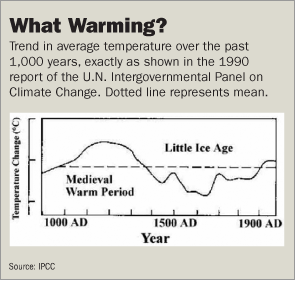Global Warming
Contrary to what we hear from Algore and other proponents of the Kyoto Treaty, the science of global warming is far from settled. This is one of the main reasons Pres. Clinton never submitted the treaty for ratification. Today's Wall Street Journal (subscription only link) looks at some data in "Kyoto by Degrees."
"So what would be a fair representation of how most scientists view the climate of the past 1,000 years? We'd suggest the graph nearby, which we reprint exactly as it appeared in the first report of the U.N.'s Intergovernmental Panel on Climate Change (hardly a group of oil-funded hacks) in 1990. It shows that our own warming period is neither unique nor all that hot.
There are other reasons to doubt the global warming alarums. For example, the computer models that predict it suggest the upper atmosphere should have warmed substantially in recent decades. But data from weather balloons and satellites don't match the projections.
There's also the matter of the alleged melting of the Antarctic ice cover, threatening a catastrophic sea level rise. In fact, recent data suggest the ice is thickening and temperatures are dropping in most of the continent. Finally, an increasing number of scientists are concluding that variations in solar radiation associated with sun spots -- that's right, the heat of the sun -- play a major role in Earth's climate.
To add it all up, the Earth is slightly warmer than it used to be a century ago, but no one knows why. Even if fossil fuels were the cause, Kyoto would make little difference, especially with China and India understandably bent on oil-fueled growth to lift their citizens out of poverty. And a warmer Earth may not be any worse than a colder one, certainly not for the longer growing seasons it would allow in the world's temperate zones. None of this justifies passing, for the first time, limits on greenhouse gases that would impose hundreds of billions of dollars in compliance costs on American energy production."





<< Home